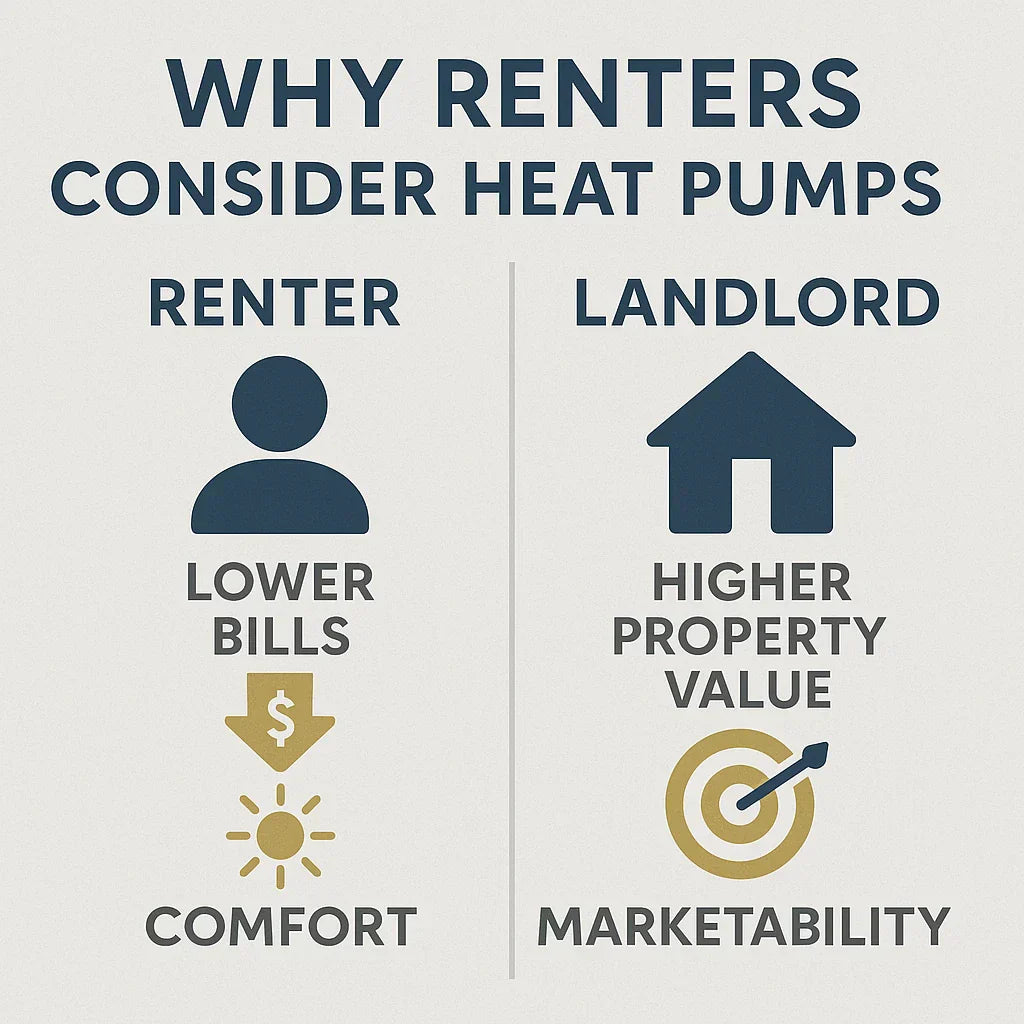Heat pumps are quickly becoming one of the most popular heating and cooling solutions for homes. They’re efficient, eco-friendly, and can dramatically cut energy bills. For homeowners, a DIY heat pump installation may be appealing. But what if you live in a rental property? Can you install a DIY heat pump in an apartment or rental house?
The short answer: probably not without your landlord’s approval. Rental agreements, building codes, and liability concerns make installing a permanent system complicated. Still, renters and landlords both have options—and understanding them can help you find the right solution for comfort and savings.
Why DIY Heat Pumps Appeal to Renters and Landlords
Benefits for Renters
-
Lower bills: Heat pumps can cut energy use compared to space heaters or window AC units.
-
Better comfort: Consistent heating and cooling, even in small apartments.
-
Healthier air: Improved indoor air quality compared to combustion-based heating.
Benefits for Landlords
-
Higher property value: Adding efficient HVAC makes units more attractive.
-
Lower vacancy rates: Tenants appreciate modern, efficient systems.
-
Tax incentives: Federal and state rebates can offset installation costs.
According to the U.S. Department of Energy, efficient heat pumps can reduce electricity use for heating by up to 65% compared to resistance heaters. That’s a win for both renters and landlords.
Legal and Lease Considerations
Before you buy a DIY heat pump kit, check your lease agreement. Most leases prohibit tenants from making permanent modifications to the property without landlord consent. Here’s why:
-
Property ownership: Any installed system becomes part of the building, not yours.
-
Liability: If your DIY installation causes a fire, leak, or damage, you could be financially responsible.
-
Permits: Many jurisdictions require permits for HVAC installations, which only landlords or licensed contractors can obtain.
-
Lease enforcement: Unauthorized modifications could even lead to eviction.
The International Code Council enforces mechanical and electrical codes adopted by most states. These codes apply to all properties—including rentals.
Challenges of Installing DIY Heat Pumps in Rentals
Structural Modifications
Mini-split heat pumps require drilling through walls for line sets and electrical runs. This isn’t something a tenant can usually do without written permission.
Equipment Ownership
If you pay for the system, does it stay with you or the landlord? Typically, once installed, HVAC systems are considered permanent fixtures of the property.
Insurance Coverage
If an unpermitted installation causes water damage or fire, the landlord’s insurance—and even your renter’s insurance—may deny coverage.
Warranty Issues
Most manufacturers require professional installation or proper permitting. A DIY install in a rental could void the warranty.
Options for Renters Who Want Efficient Heating and Cooling
Renters don’t have to stick with inefficient space heaters or window AC units. There are alternatives.
Portable and Window Heat Pumps
-
Pros: Easy setup, no permanent installation required, landlord approval usually not needed.
-
Cons: Lower efficiency and smaller capacity compared to mini-splits.
The ENERGY STAR program recommends looking for certified portable and room heat pumps that meet energy standards.
Landlord-Installed Mini-Split Systems
Instead of installing a system yourself, ask your landlord to consider an upgrade. With federal rebates and long-term ROI, it may be in their best interest.
Shared Cost Arrangements
Some renters negotiate with landlords to split the cost of an upgrade. Renters benefit from lower bills, and landlords gain property value.
Safety and Liability Concerns
DIY installations always carry risk—but in rental properties, the stakes are higher.
-
Electrical risks: Improper grounding or wiring can lead to shocks or fires.
-
Refrigerant handling: The ESFI warns DIYers against working on electrical systems without proper training.
-
Legal risks: Unauthorized work can break building codes and rental laws.
-
Insurance issues: Landlords could sue for damages caused by unapproved installations.
Simply put, renters should avoid unpermitted DIY HVAC work to stay safe and legally protected.
What Landlords Should Know About Heat Pump Upgrades
For landlords, heat pump upgrades are one of the smartest improvements you can make to a rental property.
Incentives and Rebates
-
Federal 25C tax credits cover up to 30% of installation costs.
-
Local utility rebates often apply to high-efficiency systems.
-
The EPA encourages landlords to take advantage of efficiency incentives.
Long-Term ROI
-
Reduced operating costs make units more attractive to tenants.
-
Higher rent potential with modern, efficient heating and cooling.
-
Lower maintenance compared to older systems.
Compliance and Safety
-
Professional installation ensures compliance with NEC and ICC codes.
-
Protects against liability claims from tenants.
-
Keeps warranties intact.
Final Thoughts: Who Should Install Heat Pumps in Rentals?
For renters, installing a permanent DIY heat pump in a rental is rarely possible. At best, you may be able to use portable or window-mounted systems. At worst, an unauthorized DIY install could cost you financially and legally.
For landlords, however, heat pump upgrades are a smart investment. With available rebates, long-term savings, and tenant satisfaction, they often pay for themselves.
The best approach? Collaboration. Renters should discuss energy efficiency upgrades with landlords. Landlords should explore incentives that make heat pump installation affordable and beneficial for everyone.
👉 For a complete step-by-step look at installation, start with our Complete Guide to DIY Heat Pump Installation
👉 Curious about permits, codes, and legal considerations? Check out Can You Legally Install a Heat Pump Yourself? Permits, Codes, and Warranties Explained
Alex Lane
Your Home Comfort Adovcate







